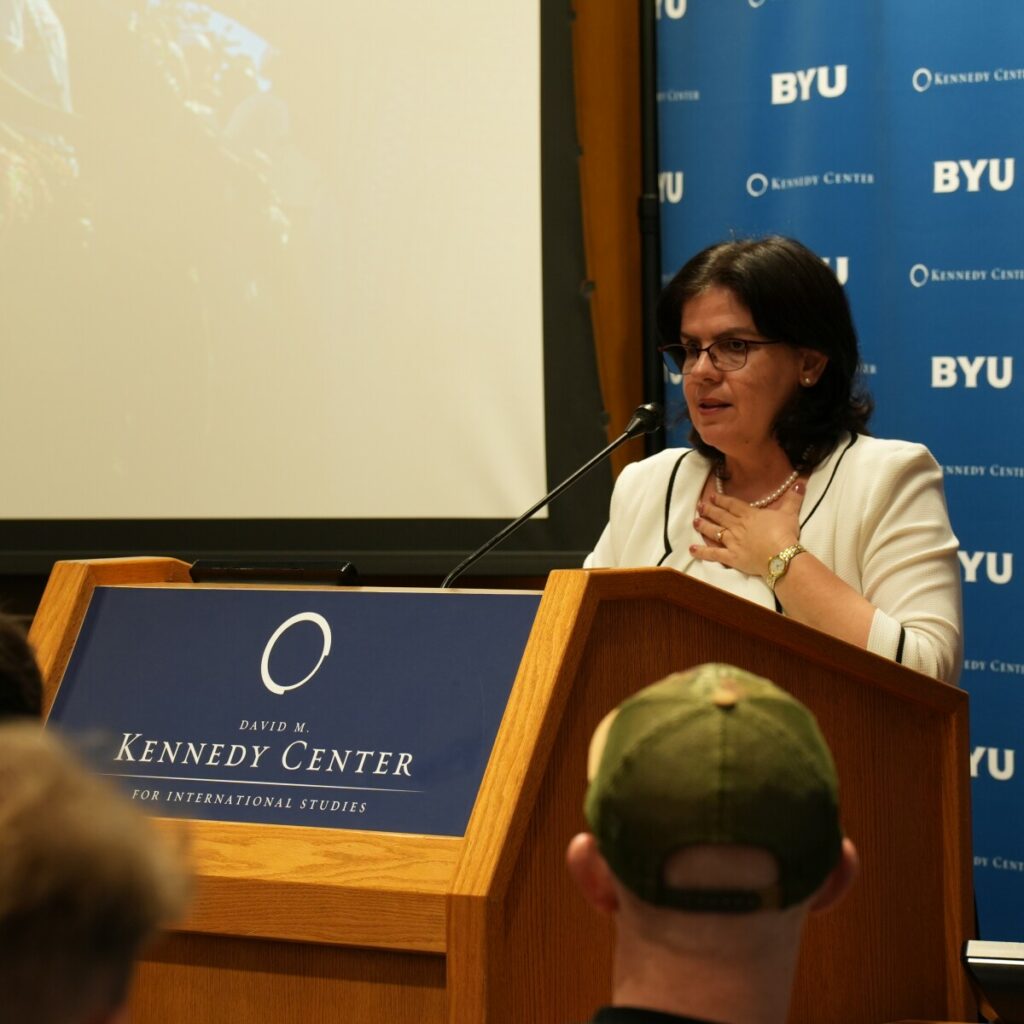Cuban ambassador Lianys Torres Rivera gives a lecture to BYU students on relations between the U.S. and Cuba. She visited BYU on Oct. 16. (Brianne Barrus)
Cuban ambassador Lianys Torres Rivera, Chargé d’affaires of the Embassy of the Republic of Cuba, spoke to BYU students and faculty at the Kennedy Center on Oct. 16 about Cuban culture and relations between Cuba and the United States.
Jeff Ringer, associate international vice president, is responsible for university diplomatic relations and helped make this lecture possible.
Ringer explained that the hope for this lecture was for students “to have a more nuanced view of the worlds of international politics, to try to gain an understanding of what the world looks like from a different vantage point (and) perhaps to open their eyes (to) different ways of viewing the world.”
However, he also emphasized that while the university will try to get multiple ambassadors to BYU during the school year, this speaker was unique because of the difficult relationship between Cuba and the U.S.
“The Cuban/U.S. relationship has been tricky for over a half a century. And so, to help the students understand some of the reasons behind that, and the path forward, was really what we hope to get out of this,” Ringer said
Ambassador Torres Rivera, the first woman to head Cuba’s mission to Washington, began her remarks by describing the Cuban identity and what makes the country unique.
“Health care, education, culture and sports in Cuba has been outstanding for a small country like mine. The development of the healthcare system is often recognized as one of the most effective in the world,” Torres Rivera said.
A student asks ambassador Lianys Torres Rivera a question during the question and answer section of her lecture. The ambassador spoke to BYU students and staff on Cuban culture and Cuban/U.S. relations. (Brianne Barrus)
She further explained the various developments that Cuba has made for its citizens, including art, literature and music, as well as growing in their social framework.
“I can assure you that Cuba’s strength in health care, education, tourism, sports and culture show a complex and resilient society. The island’s achievement in these areas — particularly given these economic constraints — highlight the innovative spirit and determination of its people for the challenge,” Torres Rivera said. “Cuba’s commitment to social equality, cultural development and international solidarity continues to define its identity on the global stage as the nation evolves.”
Addressing her audience, which included students who study foreign relations, Torres Rivera then went on to describe Cuba’s foreign relations policy.
“Cuba is proud to have diplomatic relations with 195 different countries. Cuba has 143 diplomatic missions in 116 countries,” Torres Rivera said.
However, the U.S. has a policy that restricts the kinds of relations, and the amount of trade and migration that can occur between the U.S. and Cuba.
“It is sad to see how the blockade is affecting not only the Cuban people, but also the U.S. people by not allowing them to travel as a tourist to Cuba,” Torres Rivera said.
BYU economics student Nathan Gurr said that this was one thing that he learned from the lecture.
“It felt like there was a big plea for support from the U.S. to lift sanctions. Mainly because there’s a big economic damper that’s placed on Cuba,” Graham said.
However, certain places and organizations are facilitating connections between Cuba and the U.S.
“Utah, with its unique demographic and values, has been able to establish connections that diverge from the typical U.S./Cuban narrative,” Torres Rivera said. “One of the most important areas of collaboration has been education. Universities like yours have developed programs aimed at fostering academic change with Cuban institutions.”
While there currently may be many limitations on relations between the U.S. and Cuba, the Cuban ambassador sees potential in future collaboration.
Cuban ambassador Lianys Torres Rivera smiles at students after her lecture. The ambassador came to speak at BYU on Oct. 16. (Brianne Barrus)
“Embracing this potential, Cuba and the U.S. — but specifically Cuba and Utah — can lead to a vibrant and dynamic relationship that celebrates the strength and contributions of each one of us,” Torres Rivera said, concluding her lecture.
After her lecture, there was some time during which attendees, including James Jefferies and Nathan Gurr, were able to ask questions to the ambassador.
“I think it’s great for BYU to have someone like her come, and her husband. The Kennedy Center really makes an effort to bring people like that here,” Jefferies said. “I think it’s good for the LDS church.”
The Kennedy Center will have updates for similar addresses made by other visiting ambassadors in the future.
“The intention is not only to introduce the ambassadors to Utah and to BYU more specifically, but it’s also to make sure that our students have the kind of experiences that students at George Washington or Harvard or Yale have because they’re closer to the diplomatic community,” Ringer said.
Source link : http://www.bing.com/news/apiclick.aspx?ref=FexRss&aid=&tid=671fd0988f72419b957787bacbda90f2&url=https%3A%2F%2Funiverse.byu.edu%2Fcampus%2Fcuban-ambassador-gives-lecture-at-byu-on-us-cuban-relations&c=16926664758667571961&mkt=en-us
Author :
Publish date : 2024-10-28 06:47:00
Copyright for syndicated content belongs to the linked Source.
